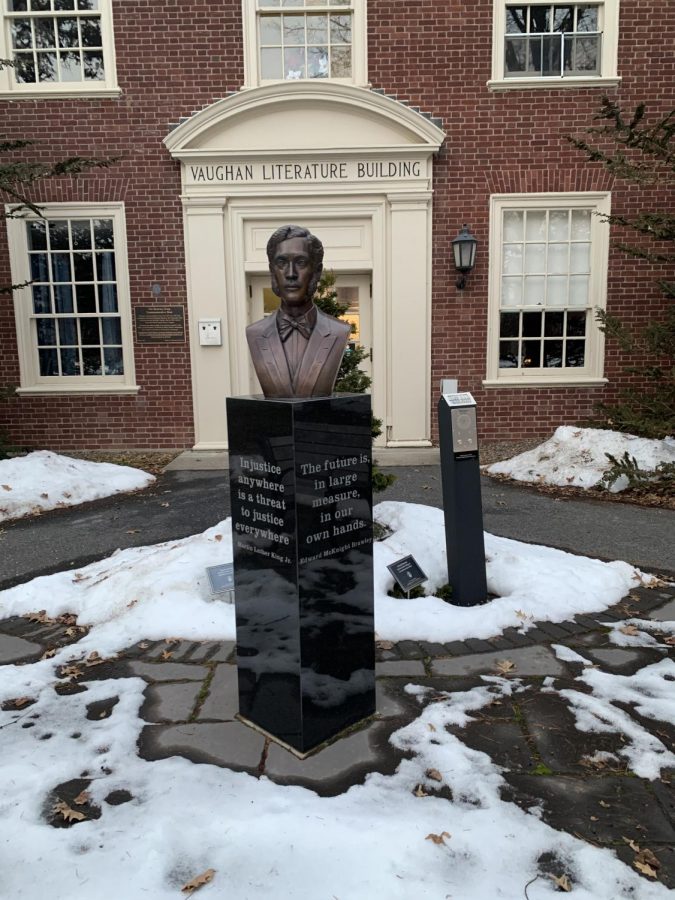Black history at the University: A reflection
February 24, 2021
Every University student is familiar with the sculpture that sits just outside of the Vaughn Literature Building. Erected in 2011, the bronze bust pays tribute to an important moment in the University’s history – its first African-American graduate.
The University’s Black history begins with the very man who adorns that corner of campus just next to the Malseradi Quad. Edward McKnight Brawley graduated from the University in 1875, breaking down barriers for subsequent generations of Black students. After obtaining his degree, he went on to become a journalist and minister. Later in his career, he would co-found Morris College and become the President of Selma College, two historically Black Baptist Bible colleges in the South.
The University provided him with a foundation for his education and career at a time when few Black scholars were allowed to matriculate at a higher education institution. Most importantly however, by creating a place for Black students at the University, Brawley paved the way for many other notable Black alumni who have made their own amazing contributions to the world since walking through the gates for their final time.
Bucknell Magazine’s winter 2021 edition centered around the work of Nyambi Nyambi, a Black actor and graduate of the Class of 2001, whose work is known for addressing many polarizing issues that have bedeviled the public consciousness recently. A lesser known, but equally noteworthy, Black alumni is Gbenga Akinnagbe. Attending the University on a wrestling scholarship, he studied political science and English before graduating in 2000. Akinnagbe is now an actor. Some of his prominent roles include Samuel Kingsley in the film adaptation of “The Sun Is Also A Star” and Chris Partlow on HBO’s “The Wire,” the latter often regarded as one of the greatest television shows of all time. He also originated the role of Tom Robinson in Aaron Sorkin’s acclaimed adaptation of “To Kill a Mockingbird” on Broadway. Akinnagbe received praise for his performance, which saw his previously more reserved character working to take control of his narrative and tell his own story.
Another exciting upcoming project in which Akinnagbe appears is the film “Passing,” based on the 1929 novel of the same name. Exploring the complexities of race and identity in both the past and present, the film received accolades at the Sundance Film Festival and will be released to the general public via Netflix later this year. Akinnagbe has also published two articles in the New York Times, and recently began the project “Lewisburg,” a prospective show inspired by his college years. The show has been picked up by NBC, and will follow his time at the University while exploring the inherent issues of race and class that students of color face at our university.
Equally deserving of praise are the members of faculty who work every day to advance the inclusion of and opportunities available to Black students on campus. The late Carmen Gillespie – a beloved professor, brilliant scholar and impassioned activist – worked tirelessly for many years to initiate programs and courses that supported the advancement and expansion of Black history and culture on campus. Most notably, in 2010, Gillespie founded the Griot Institute for the Study of Black Lives and Cultures, an organization centered around the study of Black arts, history and cultures. Operating out of Hildreth-Mirza Hall, the institute frequently presents interviews, discussions, and lectures with notable Black intellectuals to the University.
Associate Professor of History and International Relations Cymone Fourshey, who took over as the acting director of the Griot Institute after Professor Gillespie’s untimely passing in 2019, notes the importance of hosting these sorts of events every year. “We are here to tell our stories on this campus — to make known the intellectual and technological contributions of Black people and the importance of Black cultural aesthetics within America. We want to make sure that Black people’s voices are directly represented every year and not forgotten, which can easily happen in a predominantly white institution.”
A typical season at the Griot Institute consists of two parts: the fall, in which reading groups and discussions are hosted, and the spring, in which intellectuals, performers, and speakers are brought into campus to present to the student body. This year’s series is called “Artists, Agitators, & Visionaries: Chronicling Our Stories.” There are two more upcoming virtual lectures this semester. Coco Fusco, a celebrated artist and professor at Cooper Union, will present her talk “The Right to Have Rights: Cuban Artists Challenge the State” on March 3. Kia Corthron, a distinguished playwright and novelist, will speak on March 31. Any and all members of the University’s community are encouraged to attend.
The inscription on Edward McKnight Brawley’s bust displays a phrase he once wrote: “The future is, in large measure, in our own hands.” The work done by the Griot and Black University students and alumni embodies this quote: they acknowledge the remarkable and regrettable aspects of our history, while working towards a brighter future.





















